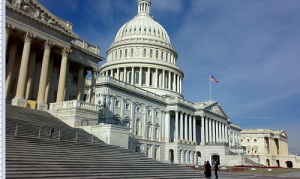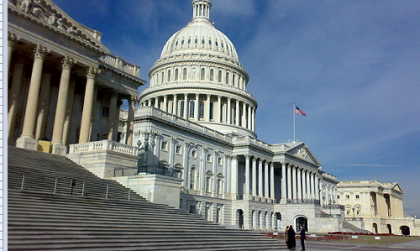New Jersey Congressmen Push Back at RAWA Efforts
Ten members of New Jersey’s US Congressional delegation have co-authored a letter to Deputy US Attorney General Rod Rosenstein, asking him to ignore pleas by a small handful of anti-gambling Congressmen to reexamine and possibly overturn an important DOJ opinion in 2011 that largely cleared the way for individual states to authorize various forms of online gambling.
The ten New Jersey legislators include both of the state’s US Senators, Robert Menendez and Cory A. Booker, along with eight of New Jersey’s 12 US Representatives. Those eight representatives included Frank LoBiondo, Leonard Lance, Tom MacArthur, Josh Gottheimer, Albio Sires, Bonnie Watson Coleman, Bill Pascrell, Jr., and Donald M. Payne, Jr.
 The letter-signing group is bipartisan though Democrat-dominated, as to be expected in a somewhat-left-leaning US state. Both Menendez and Booker are Democrats, and the eight signing Representatives were comprised of four Democrats and Republicans.
The letter-signing group is bipartisan though Democrat-dominated, as to be expected in a somewhat-left-leaning US state. Both Menendez and Booker are Democrats, and the eight signing Representatives were comprised of four Democrats and Republicans.
The rapid composition and turnaround of the letter, in the wake of the two anti-gambling and pro-“RAWA” letters sent to Rosenstein late in 2017, might also explain the absence or omission of another pro-gambling US Representative from New Jersey, Frank Pallone, from the mix. Pallone is a know industry backer as well, even if his efforts of late have been more closely associated with the state’s sports-betting fight against the US’s federal-level prohibition.
This letter, however, takes another approach, defending the 2011 opinion of then-USAG Eric Holder, while also exposing the many falsehoods in the anti-gambling screeds sent Rosenstein’s way. Those letters appear to have been the work of the online-gambling world’s #1 nemesis, Sheldon Adelson. Adelson and his Las Vegas Sands corporation have enlisted lobbyists to write legislation and letters pushing Adelson’s RAWA and anti-gambling dreams.
The New Jersey legislators are also well-versed on the topic, and their home state has been the most successful US state to date in their offering of online-gambling services.
There’s a good deal of meat in the letter from the New Jersey Congressional group’s letter. It was originally published by the Poker Players Alliance in PDF form, but we’re offering the body of it here in its text-based entirety for additional public consumption:
(January 11, 2018)
Dear Deputy Attorney General Rod Rosenstein,
We write to urge you to keep in place the Department of Justice’s 2011 decision holding that the Wire Act applies only to sports betting. The statutory language and legislative history of the Wire Act support the Department’s current decision.
As you know, the Wire Act states, “Whoever being engaged in the business of betting or wagering knowingly uses a wire communication facility for the transmission in interstate or foreign commerce of bets or wagers or information assisting in the placing of bets or wagers on any sporting event or contest, or for the transmission of a wire communication which entitles the recipient to receive money or credit as a result of bets or wagers, shall be fined under this title or shall be imprisoned not more than two years, or both.” [emphasis added] The statutory language itself makes clear that the Wire Act applies only to sports betting. And in 2002, the Fifth Circuit agreed [case reference]. Specifically, the Fifth Circuit wrote, “We agree with the district court’s statutory interpretation, its reading of the relevant case law, its summary of the relevant legislative history, and its conclusion.”
The legislative history of the Wire Act also supports the 2011 decision. Enacted in 1961, the Wire Act was meant to restrain organized crime by making sports betting over phone lines illegal. When it issued its decision, the Department noted, that while the new policy “differs from the previous interpretation of the Wire Act, it reflects the department’s position in Congressional testimony at the time the Wire Act was passed in 1961.” In other words, Congress could not have fathomed the advent of the Internet and all that it would bring.
When the Department issued its decision, critics predicted an avalanche of state legislation that would turn “every smartphone, tablet and personal computer in our country into a casino available 24 hours a day, 7 days a week.” These doomsday scenarios have not come to pass. Since 2011, only four states have passed online gambling legislation, including the online casino sites in New Jersey. Strict registration procedures, rigorous regulations, and constant monitoring have proven effective at verifying identification and preventing underage gambling than land-based casinos. Additionally, gambling experts at Washington University in St. Louis found that, “based on available research, it is unclear if the Internet contributes to more gambling problems.”
Since 2011, New Jersey has enjoyed robust revenues from online gambling. In fact, 2017 has already shattered records with $200 million in revenue in the first ten months. This has coincided with a rebirth of Atlantic City. This growth in revenue is in large part due to significant capital investments by the state in online gambling facilities, equipment, and technology that makes online gaming safe and secure. New Jersey has some of the strictest online gaming regulation protocols in the world, featuring technologies which were developed or implemented for state-mandated requirements, including precise geolocation and regulatory monitoring of all operated platforms. Additionally, players are guaranteed that the online games in the state meet regulatory standards and requirements, thus ensuring that they are protected from cheating and fraud.
Placing a blanket prohibition for online gambling would be an antiquated approach to a 21st century issue, punishing states like New Jersey – which have invested in creating a safe and secure online gaming structure – while also permitting black market operators to put millions of Americans at risk. Given the statutory language, legislative history, and clear evidence that online gaming has shown clear benefits, we respectfully request that you uphold the 2011 decision that the Wire Act does not prohibit online gambling. Please do not hesitate to contact us with any questions.
Sincerely,
(Signed)
(10 New Jersey Legislators)




















COMMENTS